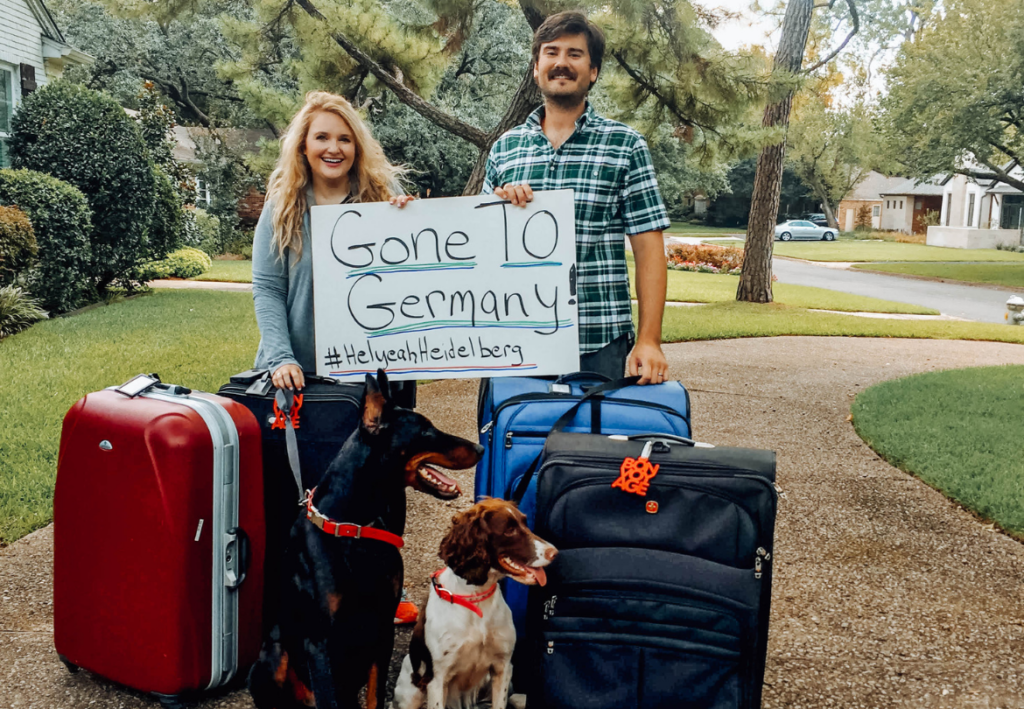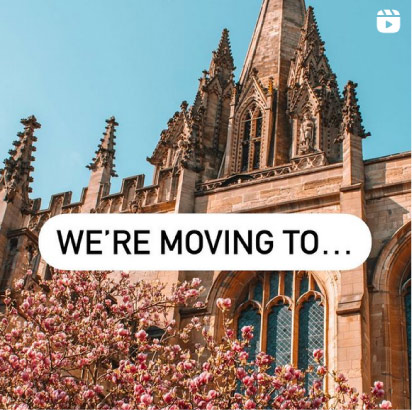Germany is the fourth largest economy in the world! It's efficient and beautiful, making it an ideal place to live.
With a booming economy, it means you can find employment here or move with a job and settle in Germany. You can do this with a German Employment visa.
Living in a different country is such an enriching experience I encourage you to take if you have the option.

Since I didn't get a German work visa, I got a Freelance visa to work and live in Germany, I wanted you to hear firsthand how to get a German working visa from someone who obtained it!
This guide will specifically look at how to get a visa as an American. So I'll let Nikki take it from here.
Like Helene mentioned, there really isn’t much information out there on how to move abroad (with or without a job). Before I moved, I was desperate for information on what to expect as an expat living abroad, specifically in Germany. That’s when I found Helene in Between. It was a gold mine for me. It was so refreshing to hear about her experience living abroad in Germany, especially from the point of view of an American.
After recently receiving ALL of my required documents (finally!) to be a working, apartment- renting, resident in Düsseldorf, Germany, I reached out to Helene and offered to share some of this information. Honestly, before moving to Germany, I would’ve killed for this information. Helene outlines her process of obtaining a visa as a self-employed Blogger, and I am going to outline my experience on how to get a German Work Visa the more typical route by working for a German company.
But first, why I moved abroad.
I grew up with a love of travel. My mother went to high school in Brussels and my grandparents lived in Belgium for 15 years. Both my parents were avid travelers and my first trip to Europe was when I was 8 months old. Family vacations included places like Italy, Greece, Egypt, and France. I’ve always dreamed of living in Europe. My childhood bedroom is (still) decorated with images from around the world.

One month into college, I was introduced to my now-boyfriend. Both being athletes, we found ourselves in the same group of friends and he became one of my closest friends. After 4 years of friendship (4 too many he would add), we finally began dating. He, a native German, shared my love of traveling, and we both dreamed of moving abroad together. A year after dating, his application for a working visa in the States was denied, and this dream of ours became an immediate reality.
Less than one week after walking across the stage at my Masters graduation, I boarded my one-way flight to Germany.
How I got a job in Germany
The months leading up to my flight, I was researching anything and everything Germany-related. I also needed to find a job. I scheduled an appointment at the German Consulate in Chicago, hoping to get information and intending to apply for a German Job-Seeker’s visa. A Job Seeker’s visa allows you to stay in Germany for 180 days, as opposed to the regular 90 days allowed for an American to stay within the EU.
I gathered all the necessary papers required for my visa appointment. I explained why I was excited about the opportunity to live in Germany and to continue working in my field. At the end of the meeting, the woman simply told me, “I will not be approving this application.” She didn’t see the purpose of me, an American with an ability to stay in the country for 3 months without a visa, to obtain a Job Seeker’s Visa. Apparently the anxiety of an international move isn’t reason enough. So I needed to get back to the drawing board and figure out how I was going to manage this move, newly graduated with a Masters Degree, and very much without a job.
In my field, the certification is internationally-recognized, and thankfully, there is an online directory with everyone in the world who has received this certification. I was able to narrow the search by country and found there were 20 individuals in Germany who had this certification. Luckily enough, there was one person who lived in Düsseldorf who had this certification and I sent him an email. Essentially, I asked if he could answer any of my questions regarding working in this field in Germany. He happily agreed, and we set up a meeting over Skype. This meeting turned (amazingly) into a job offer.
My now-boss recently starting this company, and I was his first international hire. So we had to figure this out as we went along.
What you need for a German Residence Permit (Employment)
The website for my city’s Foreigners’ Office (Ausländerbehörde) does not list every single item you need to bring with you to your appointment. The application requires a “recognized foreign degree comparable to a German degree”, which in my case, meant having my diploma and official transcript translated to German. But in other areas, the item required is incredibly vague, such as “Proof of Vocational Qualification”.

In addition to the original copies of every item on this list, you need two extra photo copies of each document. Not a time to worry about saving the environment. It was a bit of a trial-and-error process for me, with lots of clarifications via email. Wonderful things to know about when calling the Foreigner’s Office: 1) you must understand German to know which number to press to put you through to the correct department, 2) you must speak German to communicate with someone there as they do no cater to Foreigners in this manner (at an office for Foreigners no less) and 3) if the line is busy it ends the call. And the line is always busy. That means no leaving messages or being able to stay on hold until someone is available to talk. It just ends. Email has been the most successful method of communicating with the Foreigners’ Office. They have responded incredibly fast, and sometimes even responding as early as 7am. Again, however, all of my emails were written in perfect German. Thanks again, Boyfriend.
A side note here from Helene, I find that this experience depends on where you apply. Just like having my visa initially denied in Heidelberg does not mean that will happen to you. My office didn't require that you know German. So basically, like many government operations, its a case-by-case basis.
Items needed for a German Residence Permit (Employment)
Become a city resident. You need to register as a resident of the city first. You can go to your local City Hall (Bürgerbüro) within the first two weeks upon arrival. For this you need your apartment lease and a letter from your landlord.
Get Health Insurance. This you can only receive once you have a contract from your future employer, and your insurance will become active the day your contract begins. However, you need to show you have applied for health insurance when submitting your papers for a working visa. Even if you have private American health insurance that has international coverage. I submitted a copy of my health insurance application and verification of my American international health insurance coverage and this was somehow sufficient. This also is fairly time sensitive and needs to be initiated fairly soon after arrival.
Apply for your Working Visa. For your working Visa, you will also need a letter from your boss stating they wish to employ you, your salary, and for how long the contract is valid for (this could be indefinite, it just needs to be stated). It also could be beneficial if your boss states why they want/need to hire you, because the biggest hurdle for getting a working visa is that the German government wants to ensure that you are not taking a position that a qualified German could fill. Thankfully, for the field that I am in, there is a need for workers, but not so much so that I was able to qualify for a Blue Card.
They tell you it should take 6-8 weeks to process the application, but I received my approval 4 weeks post-submission. My eyes welled up with happiness the day I received my acceptance email. I could not understand if my Visa is valid for 3 years because that’s what the office decided, or because my American Passport expires in exactly three years. But in any case, I can keep my current Visa for 3 years before re-applying.
Get Paid. If you want to get paid, then you need a tax ID number (Steueridentifikationsnummber) and a social security number (Sozialversicherungsnummer). Ideally all of these numbers would arrive in a package with your working visa all tied up in a pretty bow, but unfortunately, that is not the case. The tax ID number can be requested by talking to your local Tax Authority (Finanzamt) and my company accountant was able to put in a request for my social security number.
Rent an apartment. When looking to rent an apartment, more often than not, you are required to have a SCHUFA, which is the German equivalent of a credit score. The SCHUFA collects all data related to your name and birthdate, however, in the unfortunate event that you have the same name and birthdate as another, it can lead to conflicts. So be sure to double-check the information collected in this document. You can get this online and it takes a couple days to process, or you can get this at a post office connected with a bank, and you receive it immediately. My SCHUFA contained only my gym membership and phone plan, but I had a score of 97%.
Open a bank account. To receive a paycheck and enroll for your SCHUFA, you need a German bank account. This was perhaps the easiest item on my list. I had to fill out a form with my local German address and submit a copy of my passport.
Speak German. I cannot stress this enough. You either need a translator to accompany you to all of your appointments and handle your correspondences, or you need to date a native speaker. Whichever is easiest for you.

The Process
From start to finish, my process took a total of 3 months. When I booked my flight, I had no plans except to study German. I was hoping I could make something happen. And I did. Here I am, almost a year and a half post-move, and I am still employed and live in a beautiful little apartment in Düsseldorf. I have incredible friends from all over the world, I’ve traveled to multiple countries, and I have explored this beautiful country I now call Home.
Moving abroad has been one of the most difficult things I have ever done in my life. But it has been equally just as amazing. It has also been an incredibly humbling experience. Simple things I took for granted back in Chicago are not as easy anymore. I had to re-learn how to drive, learn the basics of how to speak in a different language, and attempt to understand and practice countless cultural differences.
One of the best decisions I ever made was enrolling in German language courses. It has not only helped me really grow some roots here in my city and fully immerse myself in the culture, but it has also been the source of some of my closest friendships. It is a lot to take on with a full-time job, but very much worth it. The city of Düsseldorf actually did a follow-up
check about 3 months post Visa approval, to confirm I was continuing my German courses, and I had to submit receipts from theses courses to show my knowledge of the language was improving.
Moving also turned out to be an amazing move for my professional career. I am in a newly developing field in Germany that is already very established in the US, and I have the unique ability to really influence it and make a difference. I would not have gotten these opportunities had I stayed in the States. But this I never could have known had I not taken the risk and moved abroad.
Moving to Germany has also realized one of my life-long dreams of living in Europe. And it showed me how strong of an individual I am. Of course, I also can’t stress how grateful I am to have my best (German-speaking) friend by my side, and the incredible support from my family and friends back home.
If anyone has a dream of moving abroad, I highly recommend it. It is simultaneously never and always the best time for an international move.
I hope this has been helpful. Everyone’s experience will be different, but this was mine and I am happy to share it will anyone who could benefit from it.
Cheers to your next adventure,
Nikki Condit

Find Nikki on Instagram: @conditnikki
P.S. Travel Tip: If you haven't celebrated Karneval in Europe (heavily celebrated in Cologne and Düsseldorf), I highly recommend it. It will change your life.
If you have questions on things like health insurance, how to make friends and more, check out this post.












